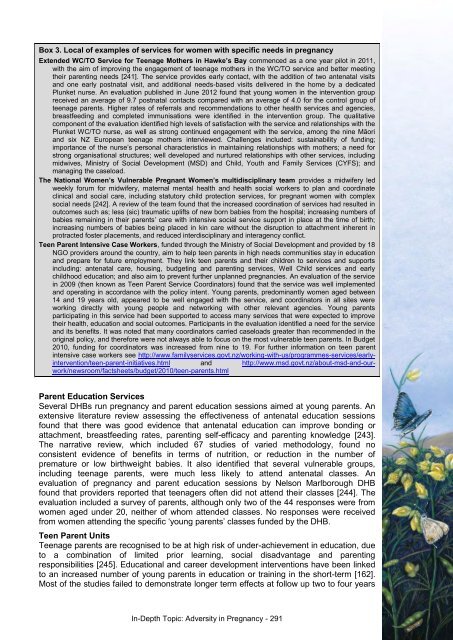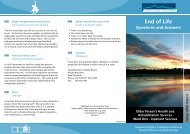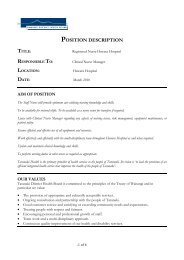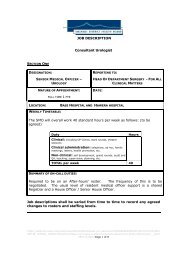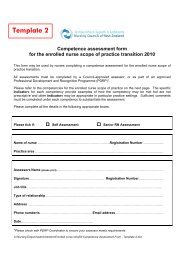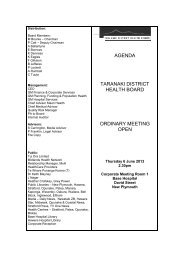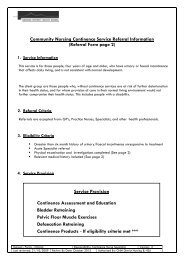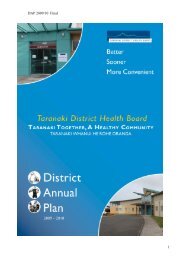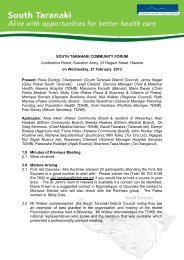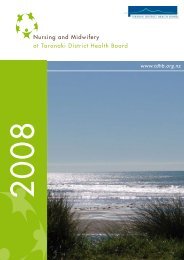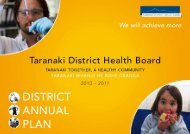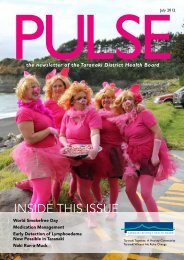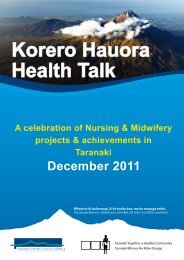This annual report - Taranaki District Health Board
This annual report - Taranaki District Health Board
This annual report - Taranaki District Health Board
- No tags were found...
Create successful ePaper yourself
Turn your PDF publications into a flip-book with our unique Google optimized e-Paper software.
Box 3. Local of examples of services for women with specific needs in pregnancyExtended WC/TO Service for Teenage Mothers in Hawke’s Bay commenced as a one year pilot in 2011,with the aim of improving the engagement of teenage mothers in the WC/TO service and better meetingtheir parenting needs [241]. The service provides early contact, with the addition of two antenatal visitsand one early postnatal visit, and additional needs-based visits delivered in the home by a dedicatedPlunket nurse. An evaluation published in June 2012 found that young women in the intervention groupreceived an average of 9.7 postnatal contacts compared with an average of 4.0 for the control group ofteenage parents. Higher rates of referrals and recommendations to other health services and agencies,breastfeeding and completed immunisations were identified in the intervention group. The qualitativecomponent of the evaluation identified high levels of satisfaction with the service and relationships with thePlunket WC/TO nurse, as well as strong continued engagement with the service, among the nine Māoriand six NZ European teenage mothers interviewed. Challenges included: sustainability of funding;importance of the nurse’s personal characteristics in maintaining relationships with mothers; a need forstrong organisational structures; well developed and nurtured relationships with other services, includingmidwives, Ministry of Social Development (MSD) and Child, Youth and Family Services (CYFS); andmanaging the caseload.The National Women’s Vulnerable Pregnant Women’s multidisciplinary team provides a midwifery ledweekly forum for midwifery, maternal mental health and health social workers to plan and coordinateclinical and social care, including statutory child protection services, for pregnant women with complexsocial needs [242]. A review of the team found that the increased coordination of services had resulted inoutcomes such as; less (sic) traumatic uplifts of new born babies from the hospital; increasing numbers ofbabies remaining in their parents’ care with intensive social service support in place at the time of birth;increasing numbers of babies being placed in kin care without the disruption to attachment inherent inprotracted foster placements, and reduced interdisciplinary and interagency conflict.Teen Parent Intensive Case Workers, funded through the Ministry of Social Development and provided by 18NGO providers around the country, aim to help teen parents in high needs communities stay in educationand prepare for future employment. They link teen parents and their children to services and supportsincluding: antenatal care, housing, budgeting and parenting services, Well Child services and earlychildhood education; and also aim to prevent further unplanned pregnancies. An evaluation of the servicein 2009 (then known as Teen Parent Service Coordinators) found that the service was well implementedand operating in accordance with the policy intent. Young parents, predominantly women aged between14 and 19 years old, appeared to be well engaged with the service, and coordinators in all sites wereworking directly with young people and networking with other relevant agencies. Young parentsparticipating in this service had been supported to access many services that were expected to improvetheir health, education and social outcomes. Participants in the evaluation identified a need for the serviceand its benefits. It was noted that many coordinators carried caseloads greater than recommended in theoriginal policy, and therefore were not always able to focus on the most vulnerable teen parents. In Budget2010, funding for coordinators was increased from nine to 19. For further information on teen parentintensive case workers see http://www.familyservices.govt.nz/working-with-us/programmes-services/earlyintervention/teen-parent-initiatives.htmland http://www.msd.govt.nz/about-msd-and-ourwork/newsroom/factsheets/budget/2010/teen-parents.htmlParent Education ServicesSeveral DHBs run pregnancy and parent education sessions aimed at young parents. Anextensive literature review assessing the effectiveness of antenatal education sessionsfound that there was good evidence that antenatal education can improve bonding orattachment, breastfeeding rates, parenting self-efficacy and parenting knowledge [243].The narrative review, which included 67 studies of varied methodology, found noconsistent evidence of benefits in terms of nutrition, or reduction in the number ofpremature or low birthweight babies. It also identified that several vulnerable groups,including teenage parents, were much less likely to attend antenatal classes. Anevaluation of pregnancy and parent education sessions by Nelson Marlborough DHBfound that providers <strong>report</strong>ed that teenagers often did not attend their classes [244]. Theevaluation included a survey of parents, although only two of the 44 responses were fromwomen aged under 20, neither of whom attended classes. No responses were receivedfrom women attending the specific ‘young parents’ classes funded by the DHB.Teen Parent UnitsTeenage parents are recognised to be at high risk of under-achievement in education, dueto a combination of limited prior learning, social disadvantage and parentingresponsibilities [245]. Educational and career development interventions have been linkedto an increased number of young parents in education or training in the short-term [162].Most of the studies failed to demonstrate longer term effects at follow up two to four yearsIn-Depth Topic: Adversity in Pregnancy - 291


